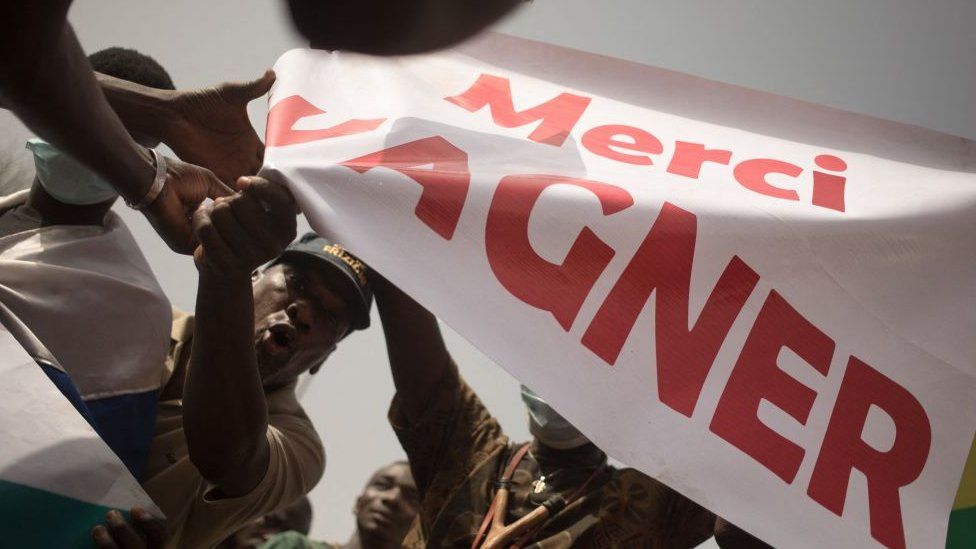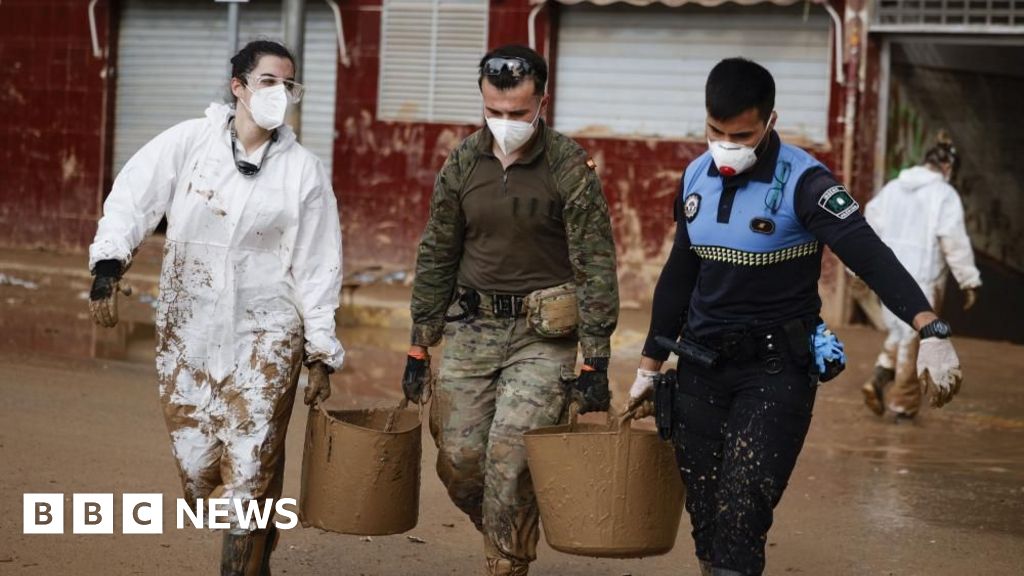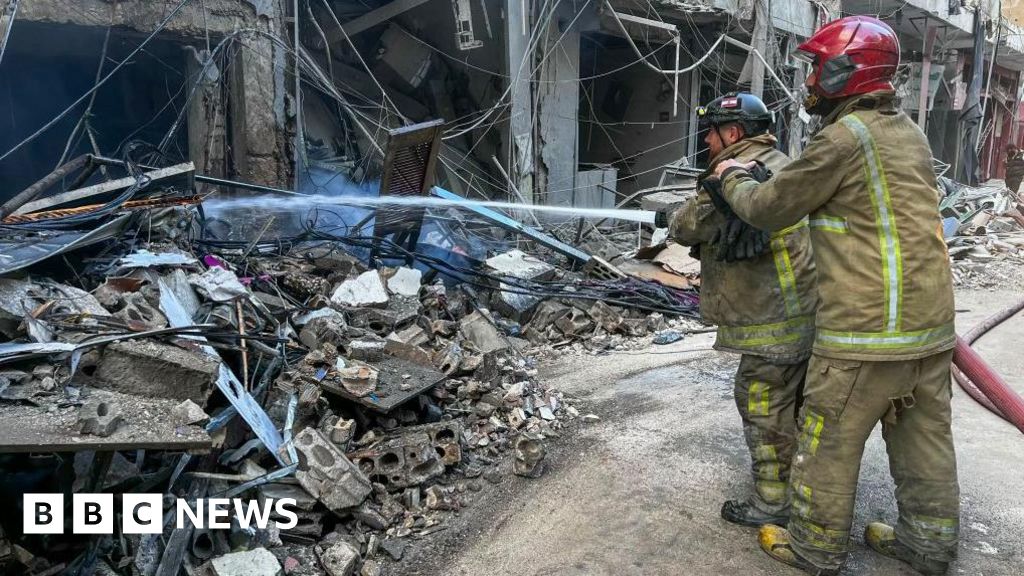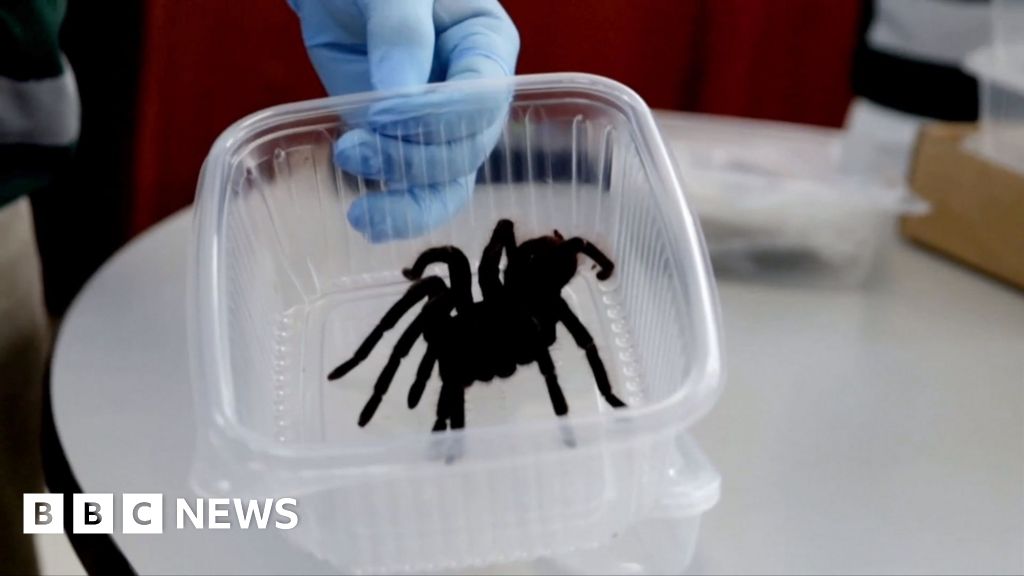ARTICLE AD BOX
 Image source, AFP
Image source, AFP
The networks promotes Russia's Wagner mercenaries
By Grigor Atanesian
Global Disinformation Team
A large social network that promotes anti-Western and pro-Kremlin ideas is helping Russia expand its influence at the expense of France in some of its former colonies in Africa.
Called Russosphère (Russian Sphere), typical posts accuse France of modern-day "colonialism", eulogise Vladimir Putin, and call the Ukrainian army "Nazis" and "Satanists", echoing the official Russian line.
They also heap praise on Russia's Wagner mercenaries - even sharing recruitment information should followers want to join up.
Experts say that such misinformation drives mistrust between African nations and the West, and contributes to a lack of support for Ukraine on the continent.
Working with Logically, the tech organisation who traced the network, the BBC's Global Disinformation Team tracked down the surprising figure behind it: a 65-year-old Belgian politician who calls himself a Stalinist.
Defending Russia and thanking Wagner
Russosphère describes itself as "a network in defence of Russia". Made up of several social media groups on different platforms, it was created in 2021 but fully launched in February 2022 - just days before the Russian invasion of Ukraine. The network swiftly gained over 80,000 followers.
A typical post on Russosphère
After the invasion, Russian state media was restricted or banned from all mainstream social platforms. Russosphère was not, and quickly became active on Facebook, YouTube and Twitter in addition to Telegram and VK - Russia's homegrown version of Facebook.
The discovery comes at a time of a swift deterioration in relationships between France and several African nations that analysts partly attribute to the Kremlin's influence and a growing pro-Russian sentiment fuelled by propaganda.
Kyle Walter is head of US investigations at Logically. Using data from their internal artificial intelligence-powered platform combined with open source intelligence, Logically tracked the network back to a man called Luc Michel.
In the past, Mr Michel has worked to legitimise votes in Russian-occupied Ukrainian territories, and been linked to "Merci [thank you] Wagner", a group supporting the work of the Russian mercenaries.
We contacted Mr Michel and he agreed to discuss Russosphère. He told us he created it, but said it received no financial support from Russia, saying it is funded by "private money".
He also insisted that he had no connections with Wagner and its head Yevgeny Prigozhin. "I manage the cyberwar, the media war… and Prigozhin conducts military activities," he said.
Image source, Luc Michel's website
Image caption,Luc Michel is little known in Europe, but promotes himself in Africa
According to Mr Walter, a co-author of Logically's report, this campaign is the first time Mr Michel's efforts have had real-world impact. "Russosphère is the first time Luc Michel and the general influence operations he runs have had significant success," he says.
"Even if the groups have been helped by bots in the beginning, they are now an authentic organic influence operation, with a large portion of real followers from across Africa."
Admirer of Gaddafi and Putin
Mr Michel's early history may seem unusual for a self-proclaimed friend of Africa.
Born in 1958, he was politically active from a young age, first in the neo-fascist groups of his native Belgium, and later as a follower of Jean Thiriart, a former Nazi collaborator who envisioned a "Euro-Soviet empire from Vladivostok to Dublin", united against America.
His career took him to Libya in support of the country's leader at the time, Muammar Gaddafi. He also went to Burundi as an advisor to then-President Pierre Nkurunziza.
Mr Michel interviewing the CAR President Touadéra
Throughout, he maintained a Russian connection, working with "Nashi", the Kremlin's youth movement, and creating a self-styled "election-monitoring group" that declared Moscow's 2014 illegal referendums in Crimea, Donetsk and Luhansk "free and fair".
"I am a Stalinist," he told the BBC. "I have defended Russia since the 1980s. I think that Russia is the only force left in Europe that is anti-American. I am nostalgic of the Soviet Union. I want a free world without America."
It is difficult to assess the impact of specific disinformation campaigns, but in Africa the pro-Russian message is being heard - amplified, say analysts, by local influencers cultivated by Russia.
"The success of people like Luc Michel is because of his opposition to France. It taps into real grievances on the ground," says Kevin Limonier, an associate professor at the University of Paris-8 studying Moscow's information operations in Africa.
"Russian misinformation was a factor helping to drive the French forces out of Sahel countries, especially Burkina Faso," according to Ulf Laessing, from the Konrad Adenauer Foundation, a centre-right German think tank.
From 2013, some 5,000 French troops had been deployed to fight militant jihadist groups in Mali as well as in Burkina Faso, Chad, Niger and Mauritania. But last year, they pulled out of Mali and are preparing to leave Burkina Faso.
Image source, AFP
Image caption,A Russian flag at a protest in Chad in October 2022
They have been under pressure from the military governments in the two countries but Beverly Ochieng from BBC Monitoring agrees that popular sentiment may have had something to do with it.
"Russian flags were waved at protests in Mali, Burkina Faso, Niger and Chad, and that is in part due to pro-Russian info-ops," she says.
In Burkina Faso, protesters attacked the French embassy and were heard demanding closer ties between Ouagadougou and Moscow.
This chimes directly with Mr Michel's aims. "I think that Russia must replace the French in all of Africa," he told the BBC.
"Estimating the impact of information operations is almost impossible," says Mr Limonier, expert in the Kremlin's influence campaigns.
But one thing is clear: such operations worry the West.
In Paris, according to Mr Limonier, "the diplomats and the military, they read it, they see it and they say: 'Oh my gosh'."

 1 year ago
71
1 year ago
71








 English (US)
English (US)